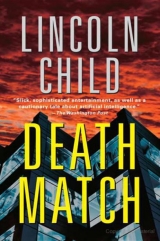
Текст книги "Death Match"
Автор книги: Lincoln Child
Соавторы: Lincoln Child
Жанр:
Триллеры
сообщить о нарушении
Текущая страница: 7 (всего у книги 26 страниц)
THIRTEEN
Lash hesitated in the doorway. Ahead lay a room almost as small as the others, simply furnished: a chair in the center with unusually long armrests; a metal cabinet beside it; a table with a laptop near the rear wall. But Lash’s attention was drawn immediately to the leads that snaked away from the chair to the laptop. He’d sat in on enough interrogations to recognize the setup as a lie detector.
A man was seated behind the table, reading from a folder. Seeing Lash, he stood and came around the table. He was tall and cadaverously thin, his head covered with iron-gray hair, closely cropped. “Thank you, Robert,” the man said to the hovering Vogel. Then he closed the door and wordlessly motioned Lash toward the center chair.
Lash complied, feeling disbelief as the man attached clips to his fingertips, fitted a blood pressure cuff to his wrist.
The man moved out of Lash’s vision for a moment. When he returned, he was holding a red cap in one hand. A long, rainbow-hued ribbon cable was affixed to one side. Dozens of clear plastic discs, each about the size of a dime, had been sewn into the cloth. Two dozen, to be exact, Lash thought grimly. He recognized it as a “red cap,” adult headgear for the Quantitative EEG test, or QEEG, which monitored the frequencies of brain activity. It was usually used for neurological disorders, dissociation, head trauma, and so forth.
This was not like any psych interview he had ever heard of.
The man injected conducting gel into each of the twenty-four electrodes, attached the cap to Lash’s head, and fitted ground leads to each of his ears. Then he returned to the table and attached the ribbon cable to the laptop. Lash watched, the cap on his head feeling uncomfortably snug.
The man sat down and began typing. He peered at the screen, typed again. He had not shaken Lash’s hand or acknowledged him in any way.
Lash waited, numb, feeling exposed and undignified in his hospital gown. He knew from experience that, at heart, psych evaluations were often battles of wit between shrink and patient. One was trying to learn things that, many times, the other did not want to have known. Perhaps this was just some unique form of that game. He remained silent, waiting, trying to clear the fatigue from his head.
The man shifted his gaze from the laptop to the folder on his desk. Then, at long last, he lifted his head and looked Lash directly in the eyes.
“Dr. Lash,” he said. “I’m Dr. Alicto, your senior evaluator.”
Lash remained silent.
“As senior evaluator, I’m privy to a little more background information than Mr. Vogel. Information, for example, that would indicate your prior job no doubt familiarized you with a lie detector test.”
Lash nodded.
“In that case we’ll dispense with the usual business of demonstrating its effectiveness. And are you also familiar with the neurofeedback device I’ve placed on your head?”
Lash nodded again.
“As a clinician, you’re probably curious about its use in this environment. You know lie detectors only measure heart rate, blood pressure, muscle tension, and so forth. We’ve found the factor-analyzed data from the QEEG an excellent complement. It allows us to go far beyond the normal ‘yes’ and ‘no’ responses of a lie detector.”
“I see.”
“Please keep your arms motionless on the armrests and your back straight. I’m going to ask some baseline questions. Answer only yes or no. Is your name Christopher Lash?”
“Yes.”
“Do you currently reside at 17 Ship Bottom Road?”
“Yes.”
“Are you thirty-nine years old?”
“Yes.”
“Now I’m going to show you a playing card. Whatever color it is, red or blue, I want you to tell me the oppositecolor. Understand?”
“Yes.”
Alicto picked up a deck of cards, withdrew a red card, held it up. “What color is this card?”
“Blue.”
“Thank you.” Alicto put the deck away. “Now then. Have you completed today’s tests in as honest and complete a manner as possible?”
The man was looking at him with a quizzical, almost dubious expression. “Of course,” Lash said.
Alicto looked back down at the folder, let the silence build a moment. “Why are you here, Dr. Lash?”
“I should think that would be obvious.”
“Actually, it’s not obvious at all.” Alicto flipped over some pages in the folder. “You see, I’ve never done an evaluation on a psychologist before. For some reason, they never become Eden candidates. Internists, cardiologists, anesthesiologists by the truckload. But never psychologists or psychotherapists. I have a theory about that. But in any case, I’ve been going over your test results of the morning, particularly the personality inventory.” He raised a scoring sheet, giving Lash the merest glimpse:

“It’s intriguing, to say the least.” Alicto replaced the sheet in the folder.
Normally, psychometric evaluators would not reveal information like this to subjects. Lash wondered why Alicto was treating him in an almost cavalier way. “If you want to know more about my taste in movies, or if I prefer cognac to whisky, you should be concentrating on the preference test.”
Alicto glanced at him. “See, that’s another thing,” he said. “Most candidates are cooperative, eager to help, candid. Sarcastic responses are most unusual and, frankly, a matter of concern.”
Annoyance began bubbling up through the haze of weariness. “In other words, you intimidate your candidates and they act like sycophants in return. I can see how that would be gratifying to one’s ego. Particularly if that ego had been inadequately nurtured in earlier life.”
A flash of something – irritation, or perhaps suspicion – flickered in Alicto’s eyes. As quickly as it had come, it was gone again.
“You seem angry,” he said. “What is it about my questions that makes you angry?”
It occurred to Lash this very line of questioning could already be providing the responses Alicto was searching for. He fought back his annoyance. “Look,” he said in as reasonable a tone as he could muster. “It’s hard to feel cooperative when strapped to a lie detector, wearing nothing but a biofeedback cap and a hospital gown.”
“Actually, most candidates appreciate the lie detector, once they’ve gotten over the initial surprise. They find it reassuring to know that any partner they are matched with has been as honest as they’ve been.”
Alicto’s calm voice added to the unreality of the situation. Lash’s anger faded and grogginess again took its place. “Why don’t we get on with the evaluation?” he asked.
“What makes you think all this isn’t part of the evaluation, Dr. Lash? I’m evaluating you as a complete person in real time, not as the faceless body that completed those tests this morning. But very well, back to the personality inventory. While your scales for falsehood and median response are good, your remedial skews abnormally high.”
Lash remained silent.
“As you know, that implies you are limiting disclosure of negative information about yourself: trying to make a good impression, or trying to minimize personal problems.”
Lash waited, cursing himself for completing the tests candidly.
“Some of your clinical scales are most unusual for an Eden candidate. For example, your social introversion scale is high, as is your individual control scale. Taken together, these indicate a loner personality; someone who has perhaps had bad experiences in relationships. Such a person would not be motivated to take such a complete – and expensive – step as coming to us.” He glanced up from the folder. “Understand, Dr. Lash, that I would not usually share such technical details with a candidate. But your being a fellow psychologist… well, it’s a unique opportunity.”
A unique opportunity to watch me squirm,Lash thought.
“Such items alone would be of concern to me as an Eden evaluator. But there are also elements of the test – may I be frank here? – that reveal distinct pathonomonic signs. Red flags, if you will.” Another turning of pages. “For example, your amorality and self-alienation scales are unusually high. Your depression scale, though not exactly high, is well above modal. Your vulnerability scale – that is, your degree of sensitiveness to surrounding events – is also high, despite your individual control scale: an anomaly I can’t immediately explain. This all seems like a dangerous cocktail, Dr. Lash. Something I would urge you to have looked at and, if necessary, treated in a clinical setting.”
Alicto closed the folder with an air of finality and turned to the laptop. “Just a few more questions, Dr. Lash. I promise you this won’t take long.”
Lash nodded. Weariness threatened to engulf him.
“How long have you been in private practice?”
“Almost three years.”
“And your specialty?”
“Family relationships. Marital relationships.”
“And your own marital status?”
“I’m single.”
“Widowed?”
“No. Divorced. As you know.”
“Just another control question for the lie detector. Your heartbeat is accelerating, Dr. Lash. I would advise you to breathe slowly. When were you divorced?”
“Three years ago.”
“What was that like for you?”
“I was married. Now I’m not.”
“And you left the FBI for private practice around the same time.” Alicto looked up from the screen. “It would seem that quite an interesting nexus of events took place three years ago: a divorce, a highly dramatic career change. Would you care to elaborate on why the divorce took place?”
Lash felt himself tense. Does he know about Wyre? Is he just baiting me?Aloud, he answered, “No.”
“Why is it so difficult for you to talk about?”
“I just don’t see the relevance.”
“No relevance? For a potential client?”
“I’m here about my future, not my past.”
“One is shaped by the other. But very well. Let’s stay in the past a little longer. Elaborate a little on what you did for the FBI, if you please.”
“I was with the Investigative Support unit out of Quantico. I examined murder scenes, drew up psychological autopsies of the victim and unsub – the perpetrator. I’d look for commonalities between them, look for cause, draw up a profile of the killer and coordinate with NCAVC.”
“How did you feel about doing that kind of work?”
“It was challenging.”
“And were you good at your job?”
“Yes.”
“Then why did you leave?”
It seemed an effort just to blink. “I grew tired of trying to figure out what had gone wrong with people after they were dead. I thought I could be more useful helping them when they were still alive.”
“Understandable. And, no doubt, you saw some terrible things.”
Lash nodded.
“But they didn’t affect you?”
“Of course they affected me.”
“What kind of a toll, exactly, did they take on you?”
“Toll?” Lash shrugged.
“So they didn’t disturb you in any pathologicalway. They ran off your back, so to speak. They didn’t affect your work or yourself.”
Lash nodded again.
“Could you answer aloud, please, Dr. Lash?”
“No, they did not.”
“I ask because I’ve read a few studies on agent burnout. Sometimes, when people see terrible things, they don’t address them as they should. Instead, they bury them, try to ignore them. And, in time, they come to live in a constant state of darkness. It’s not their fault: it’s the culture of the workplace. Showing pity, weakness, is frowned upon.”
Lash said nothing. Alicto glanced over at the laptop screen, made a notation on the folder. He paused, glancing over the sheets. Then he raised his head again.
“Was there any particular assignment in your prior job that precipitated your decision to leave? Some unusually unpleasant case, say? Some error or lapse of judgment on your part? Something, maybe, that spilled over into your private life?”
Despite the weariness, this question sent an electric twinge through Lash. So he does know, after all. He glanced quickly at Alicto, who was regarding him intently.
“No.”
“I’m sorry?”
“I said, no.”
“I see.” Alicto glanced at the screen again, made another notation. Then he leaned back from the laptop. “That concludes the interview, Dr. Lash,” he said, coming around the table and removing the cap and the finger clips. “Thank you for your patience.”
Lash stood up. The world rocked slightly and he steadied himself on the chair.
“Are you getting enough sleep?” Alicto asked. “Because I’ve observed you seem to be more than usually tired.”
“I’m fine.”
But Alicto was still looking at him closely, with what – now that the interview was concluded – seemed to be genuine concern. “You know, sleeplessness can be common in cases of—”
“I’m fine, thank you.”
Alicto nodded slowly. Then he turned away, raised his hand toward the door.
“What now?” Lash asked.
“You can put on your clothes. Vogel will see you out.”
Lash could hardly believe his luck. After what had gone before, he was sure the psychological interview would take hours. Most lie detector tests were protracted affairs, the same questions repeated over and over in slightly altered form. But this had taken just thirty minutes. “You mean, I’m done?”
“Yes, you’re done.” And the way Alicto said it made Lash hesitate.
“I’m very sorry,” said Alicto. “But in light of the results I’m going to have to recommend against your candidacy.”
Lash stared.
“There’s no point delaying the bad news. I hope you’ll understand. We have to always look at the big picture, what’s best for our clients as a whole, rather than the feelings of a single candidate. It’s difficult. We’ll provide you with some exit literature. Candidates who are declined often find reading it helps get over any feelings of rejection they might naturally have. I’m sure Vogel explained the initial fee is nonrefundable, but there will be no further charges. Take care, Dr. Lash – and bear in mind what I said about the red flags.”
And – for the first and last time – Alicto offered his hand.
FOURTEEN
Although it is three in the morning, the bedroom is bathed in merciless light. The two windows facing the deck of the pool house are rectangles of unrelieved black. The light seems so bright the entire room is reduced to a harsh geometry of right angles: the bed, the night table, the dresser. The light sucks color from the room: the wooden veneer of the dresser, the paisley comforter, the broken mirrors, are bleached to the color of bone. All that remains is the red covering the walls.
There is very little blood on the victim; remarkably little, under the circumstances. She lies naked on the carpet like a porcelain doll, alone beneath a circle of sodium vapor lights. Fingers and toes, carefully cut away at the first joint, are arranged like a halo around the head of the corpse.
There is a murmur of background voices, the low susurration of a crime scene being worked:
“Anal probe reads 83.9 degrees. Dead approximately six hours. Lack of rigor’s commensurate with this estimate.”
“Got any latents?”
“Latents is all we got.”
“Security system is central station, but the line was cut at the house foundation. Like with the Watkins girl.”
“Any entrance or egress yet?”
“The squad’s working it.”
Captain Harold Masterton, tall and heavily built, breaks away from a knot of Poughkeepsie police and walks across the room, carefully circling the bank of lights, hands in his pockets.
“Lash, you’re not looking so hot.”
“I’m fine.”
“So what do you know?”
“I’m still assessing. There are contradictory elements here, things that don’t make sense in the context.”
“Fuck the context. You’ve got enough support personnel crunching numbers back in Quantico to man a football team.”
“You’ve got the partial profile already.”
“The partial profile didn’t stop him from killing a second time.”
“I identify them. I don’t catch them. That’s your job.”
“Then give me enough to find him, for Christ’s sake. He’s written his damn autobiography twice now. He bled out two women just to get enough ink. There it is, right in front of our noses. He’s handing himself to you on a fucking plate. So when are you going to hand him to me? Or is he going to have to write it a third time?”
And Masterton gestured toward the wall, which was covered in neatly drawn block letters, crimson and recently dried, an endless litany of desperate words: I WANT TO BE CAUGHT. DONT LET ME KEEP CUTTING THEM. I DONT LIKE IT. THE SAINTS TELL ME TO CUT THEM BUT I DO NOT WANT TO BELIEVE…
Lash rose from his bed and went to the door, opened it, and walked toward the living room. The curtains of the picture window were thrown wide. Beyond, moonlight daubed the creamy breakers with a pale blue phosphorescence. The furniture was illuminated with the half-light of a Magritte painting. He sat down on the leather couch and hunched forward, arms resting on his knees, gaze still on the sea.
Earlier, as Vogel had directed him through a series of nondescript hallways and out a side door onto Fifty-fifth Street, he had been aware primarily of rage. He had walked in a red fog to his parking garage, conducting gel still drying on his scalp, throwing away the exit literature Vogel apologetically pressed into his hands. But as the evening wore on – as he’d eaten a light supper; checked his phone messages; conferred with Kline, the psychologist who was covering his practice – the anger ebbed, leaving an emptiness in its place. And when at last he could put off going to bed no longer, the emptiness began to give way to something else again.
And as he sat staring out at the sea, Dr. Alicto’s words came back yet again. You saw some terrible things. But they ran off your back. They didn’t affect your work or yourself.
Lash closed his eyes, unable to shake the lingering sense of disbelief. Going into Eden that morning, he had anticipated a great many things. But the one thing he had not anticipated was rejection. True, he’d gone through it simply as an exercise: the monochromatic Vogel; the annoying, faintly alarming Dr. Alicto – they had not known the real reason he was there. But that didn’t ease his failure. And now he’d come away from the process, not with clearer insight into the Wilners or the Thorpes, but with Dr. Alicto’s low, mellifluous voice buzzing in his head.
Sometimes, people don’t address the terrible things they see. They bury them in a deep place. And they come to live in a constant state of darkness…
During his years of analyzing and treating others, Lash had carefully abstained from directing that same searching light upon himself: from thinking about what drove him forward or held him back; about his motivations, good or bad. And yet now, here in the dark, those were the only thoughts coming into his head.
Was there any particular assignment in your prior job that precipitated your decision to leave? Some error or lapse of judgment on your part? Something that spilled over into your private life?
Lash stood up and made his way down the hall to his bathroom. He flicked on the light, opened the cupboard beneath the sink, and knelt down. There, under the extra bottles of shampoo and the blister-packs of razor blades, was a child’s shoe box. He reached for it, removed the cover. The little box was half full of small white tablets: Seconal, appropriated for him by a sympathetic fellow-agent years before, during a raid on a money launderer’s townhouse. When he’d moved to this house, he’d meant to flush them down the toilet. Somehow, he never had. And the sleeping pills had sat there, inhabiting the dark space beneath the sink, almost forgotten. They were three years old, but Lash was fairly certain they hadn’t expired. He grabbed a handful, held them in his palm, stared at them.
And then he dropped them back into the box and replaced it inside the cupboard. That would return him to the bad days, to the months just before – and just after – he left the Bureau. It was a place he did not ever want to revisit.
He rose and washed his hands, raising his face to the mirror as he did so.
Since he’d moved here, gone into private practice, sleep had returned. He could give up this case tomorrow, get back to his regular round of consultations. He could sleep well again.
And yet, somehow, he knew he could not do that. Because even now, as he looked in the mirror, he could see the ghostly outline of Lewis Thorpe, looking back at him through the wash of videotape: always, always, asking the same question…
… Why?
Lash dried his hands. Then he went back to his bedroom, lay down again, and waited – not for sleep, because sleep would not be coming – but simply for the morning.








